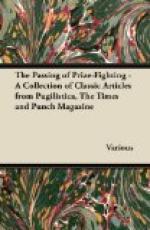Associated with the vernal prime
And widely known as “rathe,” why bloom
so late?
Was it the lure of so-called “Summer-time,”
Extended well beyond the usual date?
Our thanks for which reprieve
Are SMILLIE’S, though they didn’t ask
his leave.
Rather I think you have some lofty plan,
Such as your old friend Wordsworth
loved to sing;
That for a fair ensample set to Man
You duplicate your output
of the Spring;
That
in your heart there lodges
Dimly the hope of shaming Mr. Hodges.
Ah! gentle primrose by the river’s
brim!
Like Peter Bell (unversed
in woodland lore),
He’ll miss your meaning; you will
be to him
A yellow primrose—that
and nothing more;
He’ll
read in you no sign
Of Nature’s views about the datum-line.
O.S.
* * * * *
THE MINERS’ OPERA.
About a week ago, when they took Titterby away to the large red-brick establishment which he now adorns, certain papers which were left lying in his study passed into my hands, for I was almost his only friend. It had long been Titterby’s belief that a great future lay before the librettist who should produce topical light operas on the GILBERT and SULLIVAN model, dealing with our present-day economic crises. The thing became an idee fixe, as the French say, or, as we lamely put it in English, a fixed idea. There can be no doubt that he was engaged in the terrible task of fitting the current coal dispute to fantastic verse when a brain-cell unhappily buckled, and he was found destroying the works of his grand piano with a coal-scoop.
Most of the MS. in my possession is blurred and undecipherable, full of erasures, random stage-directions and marginal notes, amongst which occasional passages such as the following “emerge” (as Mr. SMILLIE would say):—
“Secretary. The fellow
is standing his ground,
He’s as stubborn and stiff as
a war-mule.
Minister.
A
Means will be found
If we look all around
To arrive at a suitable formula.
Chorus. Yes, you’ve got to arrive at a formula.”
Difficult though my task may be I feel it the duty of friendship to attempt to give the public some faint outline of this fascinating and curious work. Scenarios, dramatis personae and choruses had evidently caused the author inordinate trouble, for at the top of one sheet I find:—
“ACT I.
Interior of a coal-mine. Groups of colliers with lanterns and picks (? tongs). Enter Chorus of female consumers.”
Then follows this note:—
“MEM.
Can one dance in coal-mine? Look up COAL
in ‘Ency.
Brit.’ Also CELLAR FLAP;”
and later on, at the end of a passage which evidently described the dresses of the principal female characters introduced, we have the words:—




